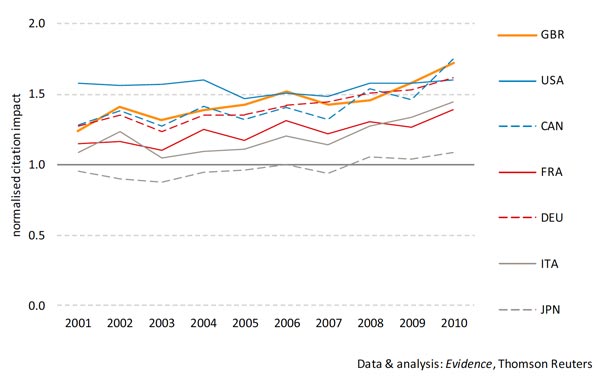
The UK has overtaken the US in terms of the quality of physics-research output, according to a new report carried out by Evidence, which is owned by information-services provider Thomson Reuters. The report, Bibliometric evaluation and international benchmarking of the UK’s physics research, states that the UK is now second to Canada when ranked on the quality of research papers, measured as the average number of times that such papers are cited.
According to the report, commissioned by the Institute of Physics (IOP), which publishes physicsworld.com, the UK’s citation impact has jumped from 1.24 in 2001 to 1.72 in 2010, putting the country second in the world. Canada comes top of such a world ranking of research quality in physics with a citation impact of 1.75, Germany is third with 1.62, the US fourth with 1.60 and Italy fifth with 1.44.
“Over the past 10 years, the UK has either languished shortly behind the US or, in better years, been level,” says IOP president Peter Knight. “In 2010, however, we took a very encouraging lead on the US when the physics community’s research output is looked at as a whole. This should give the UK great cause for celebration.”
While the UK has been publishing more papers in physics – up from 5484 in 2001 to 6240 in 2010 – its share of world physics papers has decreased from 7.1% in 2001 to 6.4% in 2010 so it now ranks seventh behind Russia (7.3%), France (7.6%), Japan (9.6%), Germany (10.5%), China (18.6%) and the US (22%). While the US still publishes more papers in physics than any other country, it is being quickly caught up by China, which has seen its share of world physics papers balloon from 8.2% in 2001 to 18.6% in 2010. It is expected that China will overtake the US in terms of the quantity of research output in physics in the next couple of years.
Asia rising
The report states that the decrease in the UK’s output as a share of world papers is mostly down to the rise of other countries, particularly in Asia, that have been publishing an ever increasing number of papers in physics. Indeed, the report states that as well as China’s rapid rise, India has increased its share of physics papers from 3% to 4.6% between 2001 and 2010, while South Korea’s output has risen from 3.4% to 4.8% over the same period.
The report notes, however, that the decrease in the UK’s share should “not be interpreted as a decline in overall capacity”. “The UK’s physics-research base is performing strongly,” the report concludes. “If the UK wishes to remain globally competitive, it will need to maintain both research output and quality.” Knight adds that China’s rise should “sound a warning shot and keep us from complacency”.



